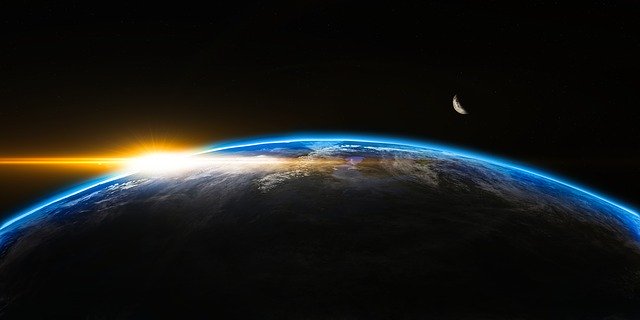L2: Christ and the Story of Scripture
Act I: Creation
The Bible’s story opens in Genesis 1:1: “In the beginning, God created the heavens and the earth.”

After Genesis 1:1, God goes forth creating and ordering the universe through his Word by the power of his Spirit. First, he created the entire universe as a theater of his glory. Then, he created humanity in his image to rule over creation as his representative. The Garden in Eden was a temple, where God would live among humanity.
This opening act of the biblical story lasts from Genesis 1–2. While it is a brief scene in light of the larger story, it is foundational to all that follows. It defines the main characters and anticipates the goal of the entire story: God’s presence with God’s people in God’s place.¹ As one theologian notes: creation presents “a singular plan of God that carries certain expectations for humanity and all creation.”²
Let’s sketch out two ways that Creation defines the rest of the story:
1. Creation defines the main characters:
God
With its opening words, the Bible defines God.
The God of the Bible is unlike any other god envisioned or worshiped by people. In this first part of the story, we learn at least three realities about God:
(a) God is the Creator-King.
God was before creation existed, and there was no other. He is the Creator-King. There is no pantheon of gods and goddesses. There is one God, one Creator-King who made it all and rules over it all with unparalleled power, status, and identity. As Creator, he does not belong to creation. Rather, he is independent of it and does not need it. All creation depends upon him. He is the Author, and creation is his story.

(b) God is the Speaking God.
We learn in creation that God speaks. He is a God who reveals himself, who makes himself known through his Word and his Word-made creation. Thus, he is a personal God. He can be known and wants to make himself known through what he says and does. We know from later in the Bible that this one God (Deut 6:4) exists in three persons: God/Father, Word/Son, and Spirit (2 Cor 13:14).
(c) God is good.
In Genesis 1, we hear the repeated saying: “God saw all that he had made, and it was good.” God is the generous giver of every good gift. He made the world good, and its goodness reflects that he is completely good. This is essential: God is good, and he created everything good. The fact that there is no evil or sin in this first act of the story teaches us that evil and sin are not necessary parts of creation. Most importantly, it tells us that evil and sin do not come from God. He is the source of life and blessing, and there is no wickedness in him. Unlike the heroes of Star Wars, there is no mix or balance of good and evil in him. No! The hero and author of this story is completely and utterly great and good. As the psalmist declares in Psalm 92:15:
The LORD is upright; he is my Rock, and there is no wickedness in him.
So, then, the Bible defines God for us at Creation. When the Bible testifies that Jesus is God, we are to understand that word “God” in light of who God reveals himself to be in the Bible. To say that Jesus is God means that we are identifying him with the good Creator-King. As John testifies in John 1:1: “In the beginning was the Word, and the Word was with God, and the Word was God!”
What else does Creation tell us about God? What does this tell us about who Jesus is?
Log in / create an account to enroll or continue where you left off.
Man
We also learn at least three realities about humanity in this first scene of the Bible’s story:
(a) God made humanity in his image.
We are created, but we are unique within creation. God created us through Jesus in his image to reflect his character and to represent his rule on the earth (Gen 1:27-28; Col 1:15-17). Two words help us understand what it means to bear God's image: (1) resemble and (2) represent.
Resemble means that God created us to be like him and to reflect his glory on the earth. How wondrous is it that God bestowed such honor upon us? As the moon reflects the brightness of the sun, God made us to reflect his glory.
Represent means that God created us to carry his kingly authority on the earth. Like ambassadors, God created us to represent his rule, especially by obeying, teaching, and living out his word.
(b) God made humanity "very good."
This is a glorious and hope-filled truth. Think about it. If God created us very good, it means that sin and evil and death are not an intrinsic part of what it means to be human. God created us very good. Death and sin entered into our humanity through Adam's sin, but they were not always part of our humanity.
Why is this a glorious and hope-filled truth?
Because it means that sin and evil and death do not always have to be part of our humanity. It means that we can be re-created and redeemed out of sin and death. The old humanity in Adam lives now under the domain of darkness (Col 1:13; 2:20; 3:7, 9-11). It was not always so, and therefore it is not necessarily so for us to be truly human.
Why is it important to realize that God created us very good? What difference does this make?
Log in / create an account to enroll or continue where you left off.
(c) Humans have a covenant head.
God created Adam as the covenant head of all humanity. One man represents us before God. While we tend to think of ourselves as individuals or families or nations, the Bible teaches that all humans ultimately belong to either Adam or Christ as their covenant head. Belonging to Adam brings death. Belonging to Christ brings life (Rom 5:12–21; 1 Cor 15:21–22). The Bible first introduces us to this truth by recounting how God created Adam and then Eve from Adam. All humanity descends from this first couple. We are all born in Adam as his children and under his headship. Why does this matter? Because our covenant head represents us before God and defines us.
In these three realities, we see how the Bible defines humanity. When the Bible testifies that Jesus is human, Genesis 1–2 helps us understand why and how Jesus could become a man. This also helps us understand how Jesus could represent his people as the covenant head of a new humanity.
Creation defines the main characters in the story: God and man.
What else does creation teach us about humanity? What does this tell us about Jesus?
Log in / create an account to enroll or continue where you left off.
2. Creation introduces the joyous hope of God’s plan:
The Garden of Eden is only the beginning of God’s plan for humanity. But like a seed that contains the plan and material needed for the mature tree, the Garden of Eden foreshadows God’s goal for humanity.

In the Garden, we see God living among his people in a place of love, bounty, and life. In the Garden, we see Adam, humanity’s covenant head, reflecting God and representing his rule for the good of all creation. The Garden introduces us to God’s goal for creation: God’s people living in God’s place with God as their King.
The goodness of this first scene of the Bible teaches us that the world is not the way it is supposed to be. When we read Genesis 1–2, we ought to look around our world and realize that we live in a different world than the one we read about in this first part of the Bible’s story. What happened? What is wrong with our world? The Bible explains this in the second part of the story: the Fall.